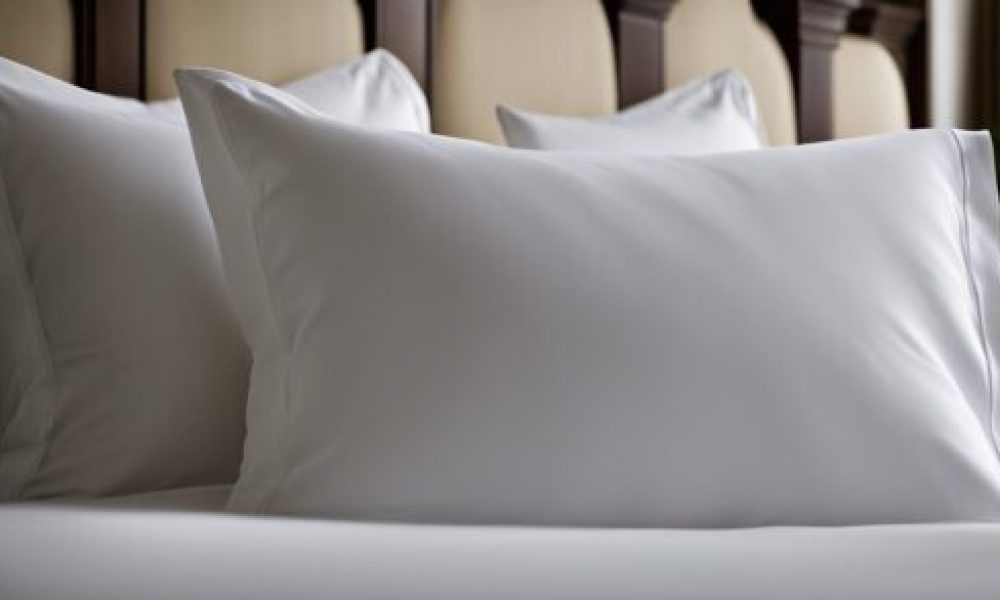Good Housekeeping in Hotels: Complete Guide to Cleanliness and Guest Satisfaction
Good Housekeeping in Hotels isn’t just about clean sheets—it’s a core pillar of guest satisfaction, reputation, and business success. From pristine rooms to polished lobbies, exceptional cleanliness leaves a lasting impression.
Key Takeaways
- Good Housekeeping in Hotels directly impacts guest experience, safety, and loyalty.
- It includes detailed cleaning, staff training, and proactive service across all areas.
- Eco-friendly products and advanced technology enhance both efficiency and sustainability.
- Guests value personalized, hygienic, and well-maintained environments—especially post-pandemic.
- Strong teamwork and regular inspections ensure consistency and compliance.
Duties and Responsibilities of the Housekeeping Department
Housekeeping ensures the hotel maintains its first impression throughout the guest’s stay. Responsibilities include maintaining guest rooms, public areas, and back-of-house spaces with impeccable attention to hygiene, aesthetics, and function.
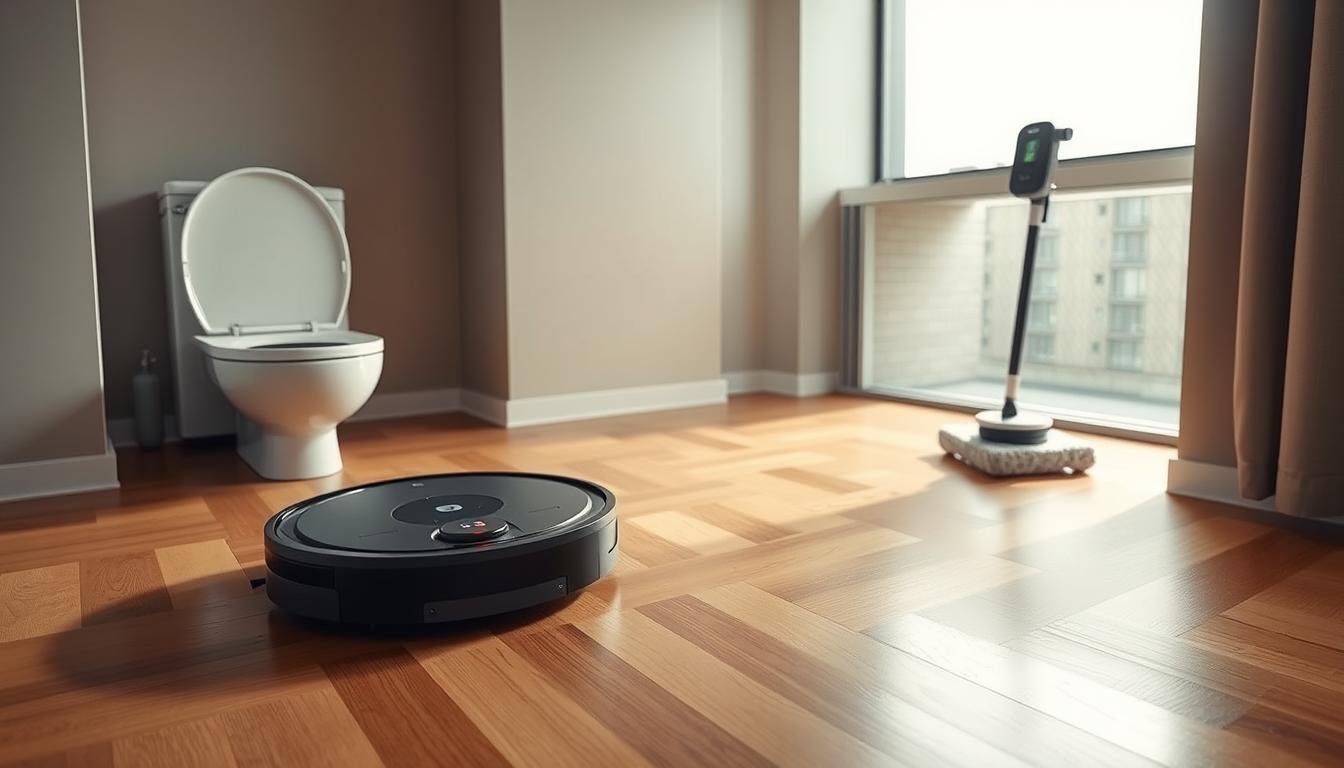
Guest Room Cleaning
Core tasks involve making beds with clean linens, dusting, vacuuming, sanitizing high-touch areas like remotes and handles, and replenishing amenities. Rooms must meet high standards that signal safety and comfort to guests.
Public Area Maintenance
Public spaces like lobbies, elevators, and hallways form a guest’s first impression. Housekeeping ensures these are spotless, well-lit, and stocked with essentials to reflect the hotel’s brand and care.
Linen and Inventory Management
Efficient inventory ensures a steady flow of clean towels, sheets, and supplies. Monitoring linen usage and quality reduces waste and supports sustainability initiatives.
Cross-Departmental Coordination
Housekeeping works with the front desk to accommodate guest requests and with maintenance to report repair needs. This teamwork ensures seamless service and faster resolution of issues.
How to Achieve Good Housekeeping in Hotels
To uphold top-tier cleanliness, hotels need consistent staffing, clear checklists, and ongoing training programs aligned with industry hygiene standards.
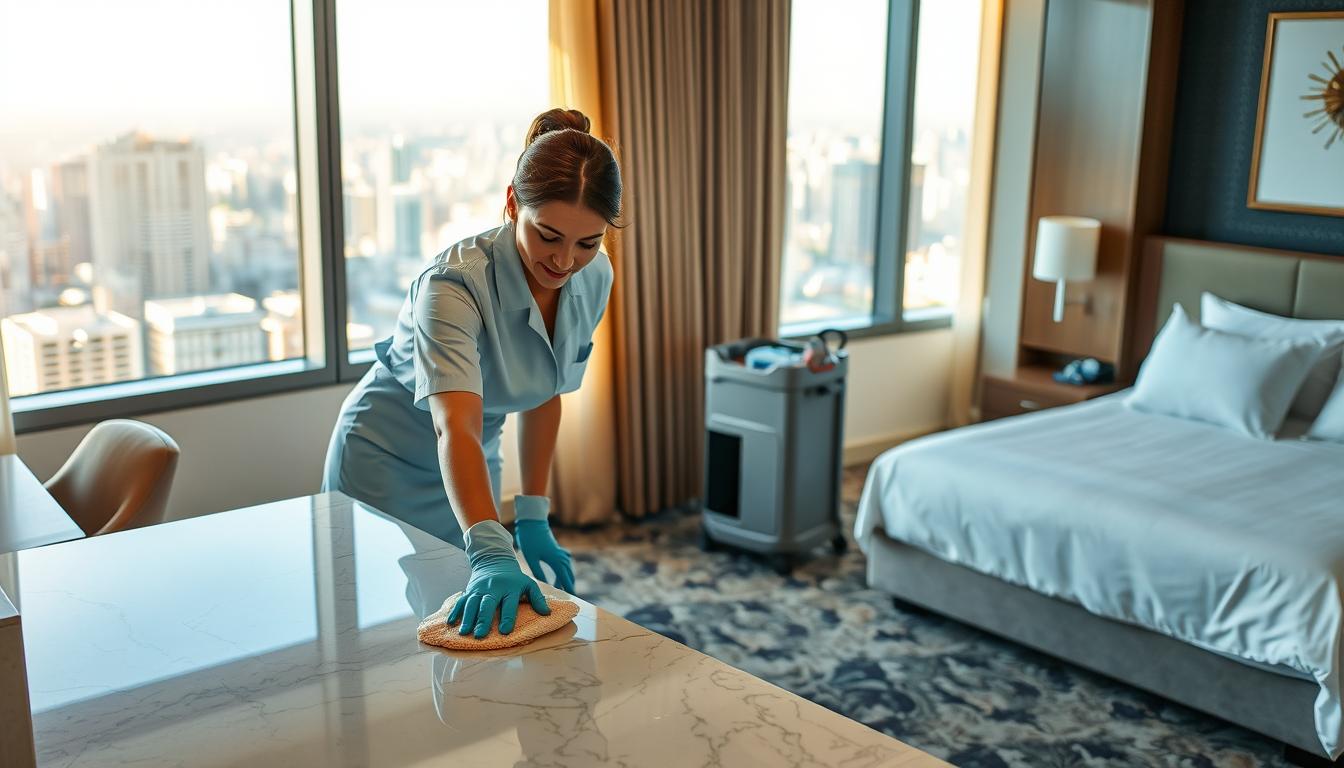
Staffing and Leadership
A well-staffed, well-led housekeeping department can efficiently meet room turnover times, ensure guest needs are met, and uphold brand standards through quality assurance practices.
Cleaning Checklists
Checklists ensure nothing is missed—covering tasks from changing linens to sanitizing doorknobs and replacing amenities. They also help maintain consistency across staff shifts.
Training and Safety Protocols
Housekeeping teams need training on chemical use, safe equipment handling, surface-specific cleaning, and updated health guidelines. This empowers staff while ensuring guest safety.
Step-by-Step Guide: Cleaning a Hotel Room
Efficient room cleaning improves guest turnaround and satisfaction. Here’s a proven checklist for effective hotel room housekeeping:
- Gather Supplies: Microfiber cloths, cleaning agents, gloves, vacuum, fresh linens.
- Declutter the Room: Remove trash, used items, and guest belongings if left behind.
- Sanitize High-Touch Surfaces: Clean light switches, remotes, handles, and fixtures thoroughly.
- Replace Linens and Stock Amenities: Provide fresh towels, bedding, and toiletries.
- Clean the Floor: Vacuum or mop, including under furniture and along baseboards.
- Inspect the Room: Do a final check to ensure everything looks perfect and welcoming.
Deep Cleaning in Hotel Housekeeping
Beyond daily cleaning, scheduled deep cleaning ensures long-term hygiene and presentation. This includes tasks that enhance durability and health safety.
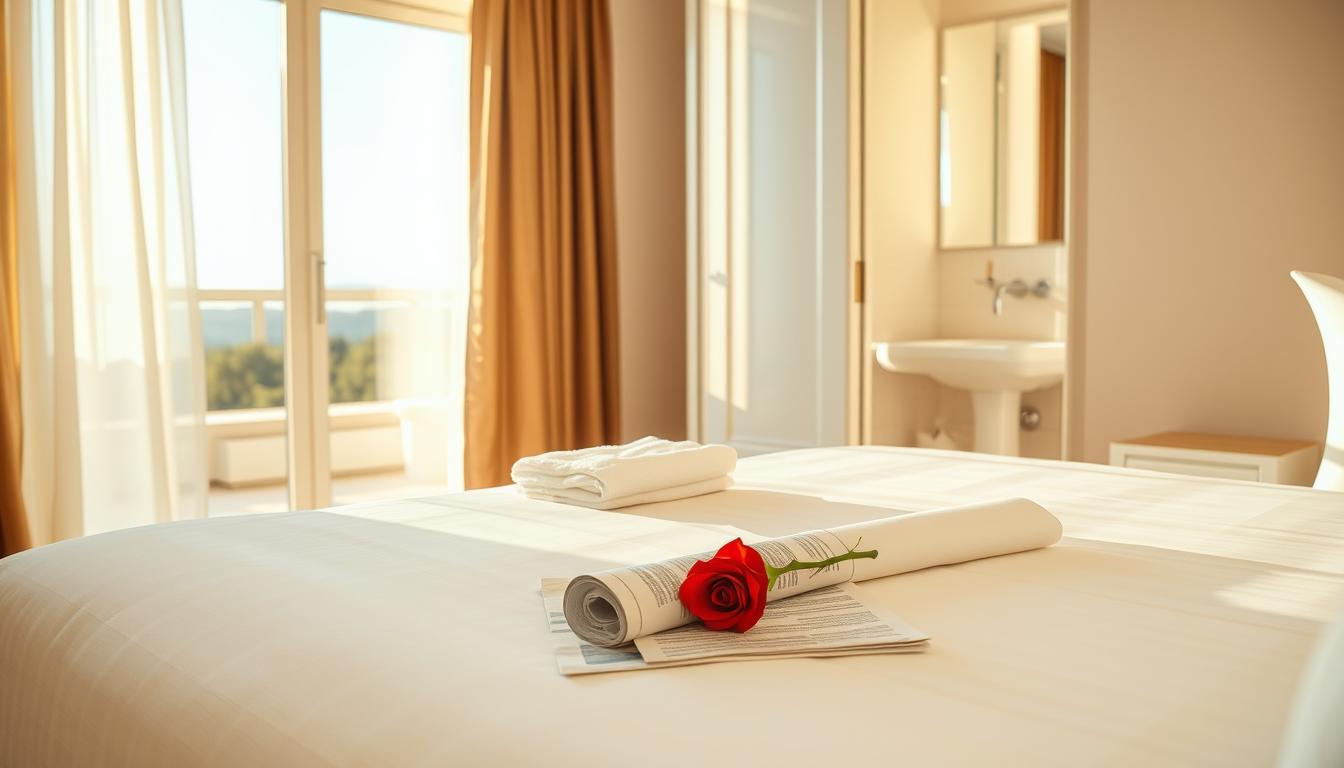
Steam Carpet Cleaning
Steam extraction removes deep-seated bacteria and stains, rejuvenating carpets and improving air quality in rooms.
Upholstery and Curtain Cleaning
Cleaning soft furnishings removes allergens and odors, ensuring a fresh, healthy space that feels brand new.
Floor Polishing and Surface Restoration
Wood, tile, and marble floors need periodic polishing to maintain their shine and prevent long-term wear and tear.
Hotel Bathroom Cleaning Best Practices
Bathrooms are the most scrutinized spaces by guests. Cleanliness here makes or breaks guest impressions.
- Ventilate the Space: Use fans or open windows while cleaning.
- Remove Used Items: Towels, mats, trash, and personal care leftovers.
- Disinfect All Surfaces: Clean mirrors, toilets, faucets, bathtubs, tiles, and grout.
- Restock Amenities: Soap, toilet paper, shampoo, and fresh towels.
- Final Touches: Align towels, polish surfaces, and scent the space lightly.
Health, Safety, and Eco-Friendly Housekeeping
Good Housekeeping in Hotels must now account for not only appearance but also environmental impact and public health. Following health guidelines is a non-negotiable part of modern operations.
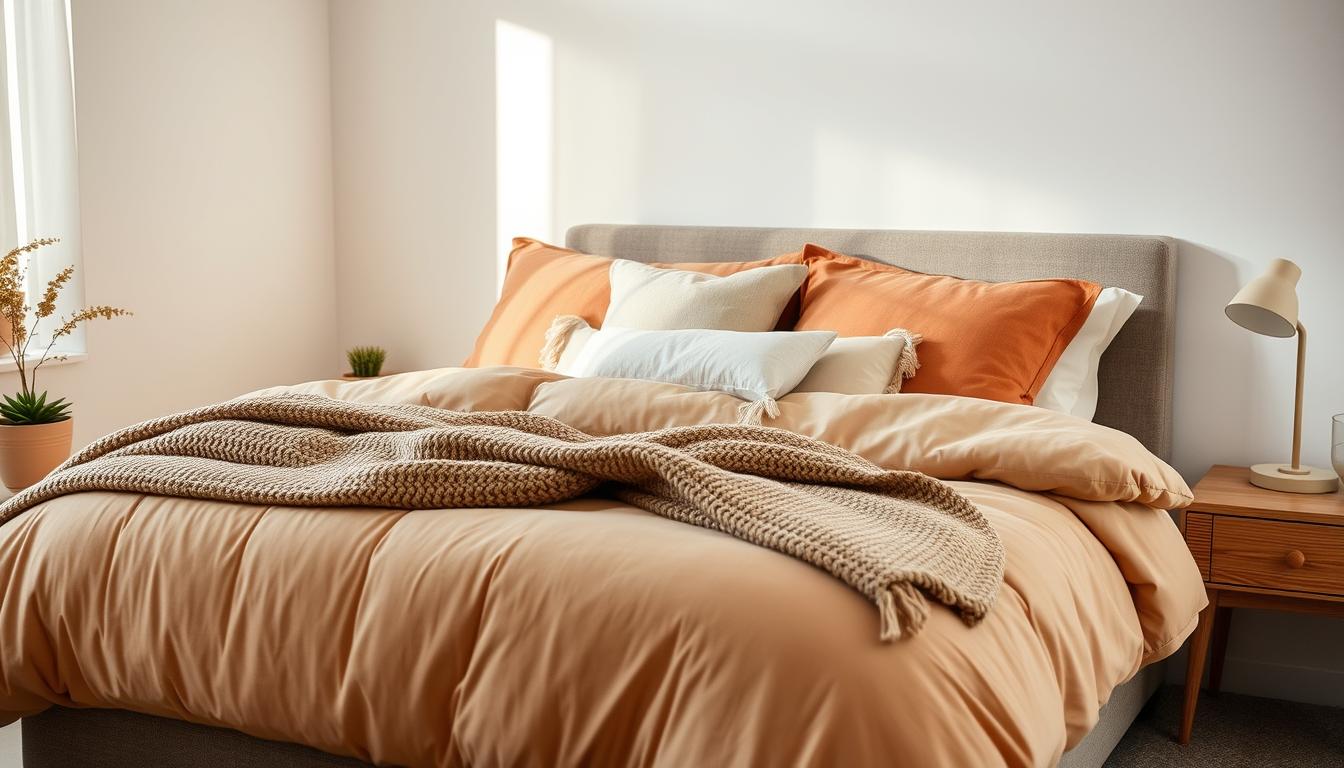
Cleaning Protocols
Use EPA-approved disinfectants, color-coded cloths to prevent cross-contamination, and schedule regular sanitation of high-touch areas like remotes and handles.
Regular Inspections
Managers should conduct walk-throughs to verify compliance and spot areas needing attention. Digital logs and audits help track progress and issues.
Sustainable Practices
Use refillable amenities, eco-friendly cleaning supplies, and minimize linen replacements for multi-night stays. These efforts save resources and appeal to eco-conscious travelers.
The Role of Technology in Hotel Housekeeping
Automation and digital tools streamline cleaning operations, reduce errors, and increase efficiency. Property Management Systems (PMS) can auto-assign rooms, notify staff, and track cleaning status in real time.
Automated Tools
UV sterilizers, robot vacuums, and advanced laundry systems reduce labor needs while enhancing cleanliness outcomes.
Digital Checklists
Mobile apps keep staff accountable and update supervisors in real time. Staff can even personalize guest preferences using data synced with guest profiles.
Future Trends in Housekeeping
Personalized experiences, eco-certifications, and flexible cleaning schedules are reshaping how hotels approach housekeeping. Anticipating guest needs before they arise is becoming a competitive advantage.
Personalization and Guest Control
Guests may prefer delayed cleaning or fragrance-free options. Offering opt-in cleaning schedules and product preferences enhances comfort and loyalty.
Guest Engagement
Encouraging simple actions like towel reuse or trash separation invites guests into a shared responsibility model—strengthening cleanliness and sustainability.
Good Housekeeping in Hotels is more than a back-end function—it’s the guest’s first and last impression. By prioritizing deep cleanliness, eco-responsibility, staff training, and technology integration, hotels can delight guests and protect their reputation for years to come.
FAQ
What is Good Housekeeping in Hotels?
It refers to consistent, high-quality cleaning and maintenance standards that ensure a hygienic, safe, and welcoming environment for hotel guests.
How does good housekeeping affect guest satisfaction?
Clean, well-maintained spaces foster trust, comfort, and peace of mind, which in turn boosts guest satisfaction and increases the chance of repeat business.
What are eco-friendly housekeeping practices?
Using non-toxic cleaning products, reducing single-use plastics, implementing towel/linen reuse programs, and recycling are key sustainable practices in modern hotels.
What technology is used in modern hotel housekeeping?
Hotels use digital checklists, room tracking systems, UV sterilization tools, robot vacuums, and PMS-integrated housekeeping modules for efficient operations.
Learn more in how to prevent bed bugs in hotel settings, choosing the right bedding materials, or eco-friendly hotel decor ideas.
Explore further insights on Sleep Foundation’s hotel hygiene guide and EPA’s safer cleaning products.

